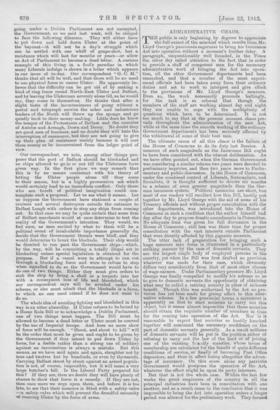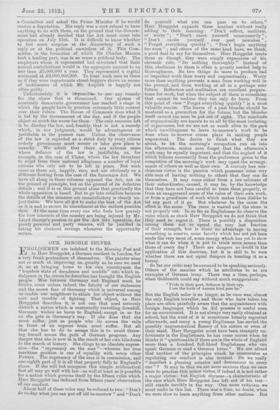ADMINISTRATIVE CHAOS.
T"public is only beginning by degrees to appreciate the full extent of the mischief which results from Mr. Lloyd George's passionate eagerness to bring his Insurance Act into operation without a moment's further delay. A paragraph, unquestionably well founded, in the Times the other day called attention to the fact that in order to provide a, staff of competent men for the necessary administrative work of bringing the Act into opera- tion, all the other Government departments had been ransacked, and that a, number of the most experi- enced officials had been taken away from their ordinary duties and set to work to interpret and give effect to the provisions of Mr. Lloyd George's measure. Even so, the work necessarily proceeds haltingly, for the task is so colossal that though the members of the staff are working almost day and night they are unable to cope with the multiplicity of questions which have to be determined. It is not too much to say that at the present moment chaos pre- vails throughout the administration of the new Act, while at the same time the smooth working of the ordinary Government departments has been seriously affected by the withdrawal of some of their best men.
The ultimate cause of all this chaos is the failure of the House of Commons to do its duty last Session. A measure of such magnitude as the Insurance Bill ought to have been considered with the utmost deliberation. As we have often pointed out, when the German Government was considering a similar scheme two years were devoted to preliminary inquiries, and then two years more to Parlia- mentary and public discussion. In the House of Commons, under the combined control of Liberals, Nationalists, and Socialists, it is thought sufficient to devote six months to a scheme of even greater magnitude than the Ger- man insurance system. Political memories are short, but most of our readers will recollect how this Bill, hastily put together by Mr. Lloyd George with the aid of some of his Treasury officials and without proper consultation with the other departments, was introduced into the House of Commons in such a condition that the author himself had day after day to propose drastic amendments in Committee. No adequate time was given for full discussion in the House of Commons ; still less was there time for proper consultation with the vast interests outside Parliament that were directly affected by this gigantic measure.
The utter lack of preparation for bringing such a huge measure into force is illustrated in a particularly striking manner by the case of domestic servants. They are the largest single body of employed persons in the country, yet when the Bill was first drafted no provision whatever was made for their case, which obviously differs very considerably from that of most other classes of wage-earners. Under Parliamentary pressure Mr. Lloyd. George was finally compelled to modify his scheme so as to give to domestic servants the opportunity of obtaining what may be called a retiring annuity in place of sickness benefit. Though this was authorized by the Act no pro- vision has yet been made for giving effect to this alter- native scheme. In a few provincial towns a movement is apparently on foot to start societies to carry out this object, but it seems almost impossible that these societies should obtain the requisite number of members in time for the coming into operation of the Act. Nor is it reasonable to expect that societies so hastily knocked together will command the necessary confidence on the part of domestic servants generally. As a. result millions of domestic servants will be put in the position either of refusing to carry out the law of the land or of joining one of the existing fr:oridly societies, whose terms of membership are calculated for the benefit of quite different conditions of service, or finally of becoming Post Office depositors, and thus in effect losing altogether the advan- tage of insurance. On this score alone any patriotic Government would postpone the operation of the Act, whatever the effect might be upon its party interests.
But that is not the whole case. Within the last few weeks the great employers of the country in all the principal industries have been in consultation with one another, and as a result came to the conclusion that it was impossible to bring the Act into operation unless a longer period was allowed for the preliminary work. They formed a Committee and asked the Prime Minister if he would receive a deputation. His reply was a curt refusal to have anything to do with them, on the ground that the Govern- ment had already decided that the Act must come into operation on July 15th. It is difficult to know whether to feel more surprise at the discourtesy of such a reply or at the political unwisdom of it. This Com- mittee, in the formation of which Sir Charles Macara took a leading part, was in no sense a political body. The employers whom it represented had calculated that their annual contributions would in the aggregate amount to no less than £5,000,000 a year. They represented a capital estimated at £2,000,000,000. To treat such men as these as if they were importunate street-beggars shows an excess of tactlessness of which Mr. Asquith is happily not often guilty. Unfortunately it is impassible. to see • any remedy for the chaos that is threatened. Our system of nominally democratic government has reached a stage in which the people have in practice extremely little control over their rulers. The House of Commons does what it is bid by the Government of the day, and if the people object so much the worse for them. The only resource left is to disobey the law, and, frankly, that is not a remedy which, in our judgment, would be advantageous or justifiable in the present case. Unless the observance of the law is regarded as a strict duty by every citizen orderly government must sooner or later give place to anarchy. We admit that there are extreme cases where defiance of the law is justifiable, as, for example, in the case of Ulster, where the law threatens to expel from their national allegiance a number of loyal citizens who only ask to be left in peace. But such cases as these are, happily, rare, and are obviously on a different footing from the case of the Insurance Act. We have all along in these columns opposed the Act, not on the ground of principle, but on the ground of its defective details ; and it is on this ground alone that practically the whole opposition is based. But to go into rebellion because the details of the measure are unsatisfactory is clearly un- justifiable. We have all got to make the best of the Act as it is and to secure its amendment at the earliest possible date. At the same time every one who feels how gravely the true interests of the country are being injured by Mr. Lloyd George's passion to get the Act into operation, for purely personal and party reasons, will be justified in taking his electoral revenge whenever the opportunity occurs.











































 Previous page
Previous page